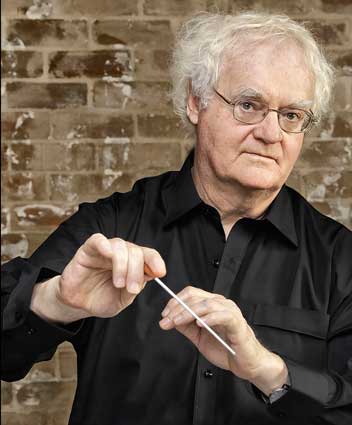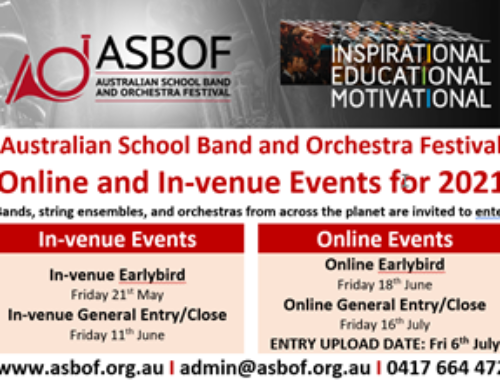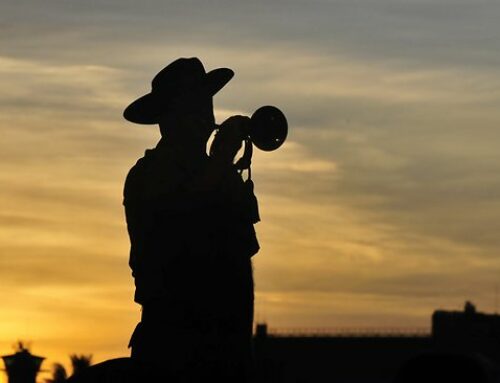
Tribute to Richard Gill
In 2018 Australia lost one of its national treasures, and the Festival lost one of its great friends, with passing of Richard Gill. Richard was Patron of both the NSW School Band Festival and the Australian School Orchestral Festival.
ASBOF General Manager, Pat Devery, offers a tribute to Richard Gill and some reflections on his contribution to music education in Australia.
__________
Every Child Deserves a Music Education
I first met Richard Gill on a spring day in 2006, out the back of Cliff Goodchild’s Kensington home. We were meeting to finalise Gill’s appointment as the Patron for the NSW School Band Festival, now the Australian School Band and Orchestra Festival (ASBOF). I didn’t fully appreciate the portent of the meeting at the time. Two great visionaries in the Australian music education scene, trading stories like a pair of old prize fighters who had been there from the start; who had seen, and done, it all.
For me, the vision and energy of the two men was palpable: Goodchild, the founder and driving force behind the Festival; Gill, well on the way to forging his reputation as a national icon in music education, having recently come to the notice of the broader Australian public through his colourful appearances on the ABC’s Spicks and Specks. Gill’s blend of intelligence, musical knowledge, and the great sense of fun with which he approached life, was obvious for all to see on television. But it was nothing compared to seeing him working up close with young people.
I had been lucky enough to witness this first-hand in the late ‘90s while working at a school, well known for its sporting prowess, in Sydney’s Macarthur region. A group of players from the First XIII Rugby League team, returning from an afternoon training session, stopped in at the gymnasium where Gill was running a soundcheck for a regional tour of The Magic Flute he was conducting. Gill spied the boys in the bleachers and, never one to miss an opportunity to proselytise, coaxed them down to the stage area where he gave a rapid-fire synopsis of the story along with a quick explanation as to what he was trying to achieve in the rehearsal.
Ever alert to his audience, Gill pitched his explanations in terms of the unique physical skills required of the artists: the preparation, teamwork, and attention to detail essential to each performance; and the long hours and incredible discipline required to produce music at an elite level, something which resonated strongly with the gifted young athletes he had before him. I have rarely seen a more unlikely, and more engaging teaching moment. It was like watching a master craftsman working his clay.
‘Every child deserves a music education,’ Gill used to say. He fundamentally believed that the arts are the lifeblood of a nation and that music was at the heart of the arts. ‘Without music,’ he asserted ‘no culture can call itself complete.’ It followed, then, that an education with little or no music at its core was an incomplete education, and Gill set about convincing the nation of this fact.
Richard and Cliff were united in their views when it came to music education, most significantly in their shared understanding that the musical endeavours of young people ought to be celebrated; that authentic music education is not about competitions, judging and ranking, winners and losers.
Like Cliff, Richard was a person who believed in asking forgiveness, not permission, the story of how he got his start at Marsden High instructive in this respect. Richard described how the band had been in decline in the years before he appeared, and the Department bean counters were arriving on Monday to ‘redeploy the assets.’ ‘You wouldn’t believe it, Pat’, Richard recounted in his deadpan manner, ‘but there was a break-in over the weekend and all the instruments were taken’. Those Marsden High students were not to be denied, however, the thief, clearly suffering a qualm of conscience, returned the instruments some days later. Richard and the band never looked back.
Years of lobbying saw Gill set up the national Music Teacher Mentoring Program in 2016, aimed at reigniting the capacity and passion for primary school teachers to deliver music programs. He firmly believed that the very things which promoted literacy and numeracy are the arts, beginning with serious arts education in the early years. If we want a creative nation, an imaginative nation, a thinking nation, and a nation of individuals, he would say, then we must increase the time for arts education, especially music education.
Gill understood that music, when properly taught by trained professionals, requires an extraordinarily high level of listening and concentration from the student. It requires the student to have a capacity to work in the abstract, an ability to work across several skill areas simultaneously, and the ability to rationalise this verbally.
Rather than relying on individual parent communities, how much better would it be, he reasoned, to see our governments commit to appropriately funding the training of specialist music teachers who will pay our community back a thousand-fold by enriching the lives of hundreds of thousands of children. It is noticeable, he would observe, that there is a constant push to ensure we have qualified maths and science teachers in our classrooms. All the evidence points to the study of music being no less, if not more, significant to a child’s learning outcomes.
We currently have no comprehensive national instrumental music program in place. Queensland is often touted as the leader in the field, with every government school theoretically entitled to a qualified instrumental music teacher. Conversations with practitioners in the field, however, would indicate that the delivery of these programs is uneven, largely dependent on the availability of suitably trained teachers, and a supportive school leadership team and parent community.
Despite the lack of a system wide approach, however, Gill’s philosophy of winning people over, one conversation at a time, is having an effect. More than 10,000 students from over 340 primary and secondary school concert and big bands, string ensembles, and orchestras from NSW, Interstate, and International schools will perform at this year’s ASBOF, and there are some great things happening in our schools.
Many schools regularly engage professional musicians to work with their ensembles. In May this year, Denis DiBlasio, former Music Director for Maynard Ferguson, and one of the world’s leading big band clinicians, visited a number of Sydney schools as well as guest performing with six of our elite school big bands in the Frank Coughlan Premier Big Band Event of the Festival.
The Scots College, under the leadership of Paul Vickers, run a series of music Masterclasses each year where industry professionals work with students in an open rehearsal setting, offering invaluable insights into musical interpretation, rehearsal techniques, and performance skills.
Gill’s firm belief that students should be engaged in both performing and creating music is being realised as schools such as Newtown High School of the Performing Arts, under Jason Isaac, regularly workshop student compositions, and Ashbury Public School has a student ‘Composer’s Recital’ each semester providing an authentic learning experience for all concerned. Isaac also works closely with a range of local schools, including St Andrew’s Cathedral College and Fort St High, to set up music mentor programs where secondary school students assist younger players in guided sectional rehearsals.
If anyone needs to be convinced that instrumental music is alive and well in our schools, in many respects despite the inherent obstacles music directors and students face, one only need attend the ASBOF Percy Grainger Premier Event for secondary school concert bands. The incredible talent and musical proficiency on display from schools such as Manly Campus, Sydney Grammar, Barker College, and Newtown High School of the Performing Arts regularly astounds audiences and never ceases to elicit intense praise from our international adjudicators who struggle to comprehend how we produce such excellent results against the odds. As Richard would say, how much more will we achieve when we are given the resources to do it properly.
Gill and Goodchild both possessed a burning passion for Australian music. At Cliff’s insistence, our premier bands in the Grainger and Lithgow events were required to perform a substantial Australian work and in 2016, in what was probably an Australian first, the Festival made it compulsory for all ensembles to perform a work by an Australian composer, the idea being to support our local talent and to promote a home-grown music culture. Richard loudly applauded this idea.
Cliff insisted all the Festival events be name in honour of Australians who had made significant contributions to the Australian music or the Australian music education scene, the two most recently initiated events honouring Jodie Blackshaw (concert bands) and Judy Bailey (big bands). The Premier Secondary School Orchestral Event, initiated in 2016, is named in honour of Gill, despite his reluctance. ‘You’re not going to be around forever’, I quipped at the time.
The music education legacy of both men continues to this day. The ASBOF presents an annual scholarship in honour of Cliff Goodchild, and Gill’s impact continues both with his National Mentor Program and the Muswellbrook Richard Gill Music Academy, a school set to open in 2020 with a small cohort from K-3 with Gill’s music education philosophy at its core.
In the weeks before Richard died, I texted him the following: ‘Richard, you are an inspiration. Without wanting to sound melodramatic, it is a privilege to know you and I am so pleased we named our premier Orchestral event in your honour – despite your protestations! I promise we will do everything we can to continue the incredible work you and Cliff commenced all those years ago’.
The simple message came back: ‘Thank you so much. Take care. Richard’
Gill left a legacy of significant value in that he has been an inspiration to, and mentor for, conductors, musicians, composers and music educators nation-wide. His work is an example to us all of how we must never give up the idea that every child in this country should have access to the best education we can provide, and that music must be an essential part of that idea.
The day before Richard died, his long time friend and ASBOF Director, Paul Goodchild, organised for a ‘small’ group of musicians to gather outside his home and play for him. Close to 100 people showed up. The occasion reminded me of the title of Eric Bogle’s evocative song, Singing His Spirit Home, and was, for all who were there, a most profound musical experience.
We will leave the final word to Richard:
We teach music because it is unique and good.
We teach music so that children can make their own music.
We teach music because it acts in a unique way on the heart, mind, soul and spirit of the child, stimulating thought and imagination in very special ways. These are the real reasons for teaching music.
Pat Devery
General Manger
This article, with some alterations, first appeared in the Independent Education magazine.




